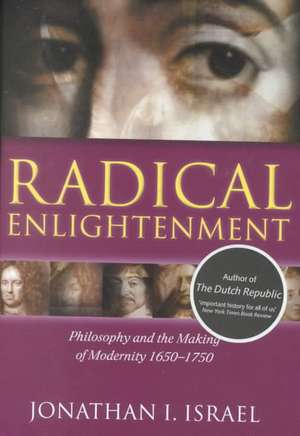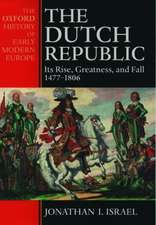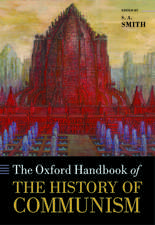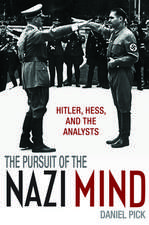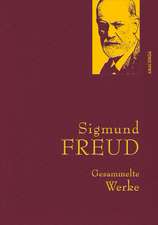Radical Enlightenment: Philosophy and the Making of Modernity 1650-1750
Autor Jonathan I. Israelen Limba Engleză Hardback – 8 feb 2001
| Toate formatele și edițiile | Preț | Express |
|---|---|---|
| Paperback (1) | 360.70 lei 10-16 zile | +86.72 lei 10-14 zile |
| Oxford University Press – 18 iul 2002 | 360.70 lei 10-16 zile | +86.72 lei 10-14 zile |
| Hardback (1) | 904.23 lei 31-37 zile | |
| OUP OXFORD – 8 feb 2001 | 904.23 lei 31-37 zile |
Preț: 904.23 lei
Preț vechi: 1271.57 lei
-29% Nou
Puncte Express: 1356
Preț estimativ în valută:
173.02€ • 181.14$ • 143.17£
173.02€ • 181.14$ • 143.17£
Carte tipărită la comandă
Livrare economică 25-31 martie
Preluare comenzi: 021 569.72.76
Specificații
ISBN-13: 9780198206088
ISBN-10: 0198206089
Pagini: 832
Ilustrații: 16 pp plates, 5 halftones, map
Dimensiuni: 166 x 242 x 47 mm
Greutate: 1.27 kg
Editura: OUP OXFORD
Colecția OUP Oxford
Locul publicării:Oxford, United Kingdom
ISBN-10: 0198206089
Pagini: 832
Ilustrații: 16 pp plates, 5 halftones, map
Dimensiuni: 166 x 242 x 47 mm
Greutate: 1.27 kg
Editura: OUP OXFORD
Colecția OUP Oxford
Locul publicării:Oxford, United Kingdom
Recenzii
Massive and brilliant book ... Israel displays a profound, and contagious, sympathy for the intellectual movement he describes ... Israel has given us a vast panorama of the unfolding of Enlightenment thought during the crucial century between 1650 and 1750 ... The book is a real tour de force ... magisterial.
A brilliant achievement, piecing together some highly elusive strands of the early enlightenment in a way which not only makes compulsive reading, but is also bound to have a major and permanent impact on enlightenment scholarship as a whole.
This book gives the early radical enlightenment a clarity and power which historians of the early modern period will find impossible to ignore.
As a formidably well-researched history of radical thinking from the mid-seventeenth century through to the French Revolution, and of the scholars who confronted each other at the time in sometimes ferociously bitter disputes, this book has no rival.
In an age of historical miniaturists, it is exhilarating to encounter a scholar who is willing to cover walls and ceilings with a magnificent sprawling historical fresco. Israel has put forward a Grand Historical Thesis of the sort that historians once revelled in, but that has largely gone out of style. He has done so, moreover, with panache and in detail, revealing a command of texts and archival documents, local milieux and international currents, that compels admiration Radical Enlightenment swarms with fascinating material of every sort, so rich and varied that no review can do it justice.
Radical Enlightenment deserves to be widely read because it is an example of ground-breaking, vastly well-informed and thoroughly new history.
Jonathan Israel's ardour, erudition and willingness to challenge widely accepted notions make his book a great achievement - one that entitles him to the gratitude of the entire world of learning.
Magnificent and magisterial, Radical Enlightenment will undoubtedly be one of the truly great historical works of the decade.
Magnificent ... sumptuous in the energy, clarity, and of the breadth of its scholarship ... [A] masterpiece.
Remarkable historical study ... the author succeeds in turning a mountain of evidence into crisp, fresh prose.
That Israel has taken so much learning and compressed it into such an informative and stimulating read is a remarkable achievement ... The book must be considered the standard by which future histories of philosophy will be measured.
We have gained a much more detailed and fine-grained view of the sheer diversity and intellectual creativity not just amongst those who may have been influenced by Spinoza, but also amongst their critics, and those who may be deemed part of either the moderate Enlightenment or even a Counter-Enlightenment.
A brilliant achievement, piecing together some highly elusive strands of the early enlightenment in a way which not only makes compulsive reading, but is also bound to have a major and permanent impact on enlightenment scholarship as a whole.
This book gives the early radical enlightenment a clarity and power which historians of the early modern period will find impossible to ignore.
As a formidably well-researched history of radical thinking from the mid-seventeenth century through to the French Revolution, and of the scholars who confronted each other at the time in sometimes ferociously bitter disputes, this book has no rival.
In an age of historical miniaturists, it is exhilarating to encounter a scholar who is willing to cover walls and ceilings with a magnificent sprawling historical fresco. Israel has put forward a Grand Historical Thesis of the sort that historians once revelled in, but that has largely gone out of style. He has done so, moreover, with panache and in detail, revealing a command of texts and archival documents, local milieux and international currents, that compels admiration Radical Enlightenment swarms with fascinating material of every sort, so rich and varied that no review can do it justice.
Radical Enlightenment deserves to be widely read because it is an example of ground-breaking, vastly well-informed and thoroughly new history.
Jonathan Israel's ardour, erudition and willingness to challenge widely accepted notions make his book a great achievement - one that entitles him to the gratitude of the entire world of learning.
Magnificent and magisterial, Radical Enlightenment will undoubtedly be one of the truly great historical works of the decade.
Magnificent ... sumptuous in the energy, clarity, and of the breadth of its scholarship ... [A] masterpiece.
Remarkable historical study ... the author succeeds in turning a mountain of evidence into crisp, fresh prose.
That Israel has taken so much learning and compressed it into such an informative and stimulating read is a remarkable achievement ... The book must be considered the standard by which future histories of philosophy will be measured.
We have gained a much more detailed and fine-grained view of the sheer diversity and intellectual creativity not just amongst those who may have been influenced by Spinoza, but also amongst their critics, and those who may be deemed part of either the moderate Enlightenment or even a Counter-Enlightenment.
